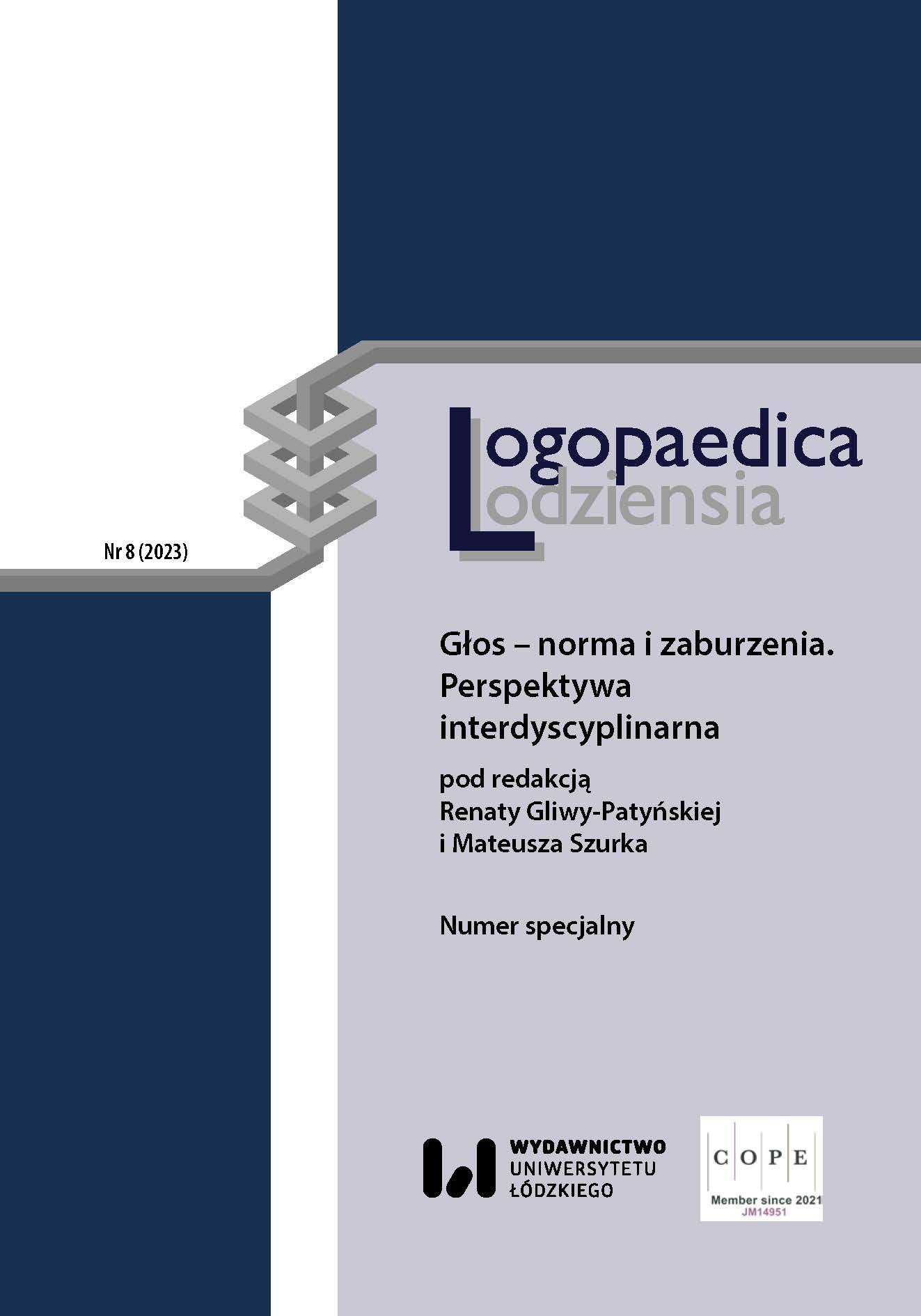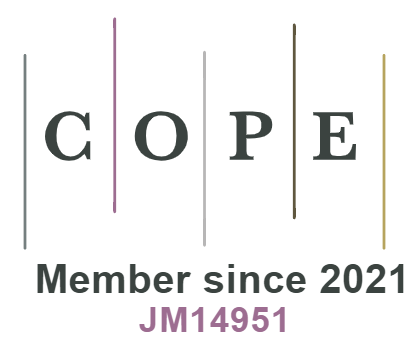Voice Self‑Assessment in the Light of Acoustic Analysis – Case Studies
DOI:
https://doi.org/10.18778/2544-7238.08.05Keywords:
Voice Handicap Index (VHI), VHI-POL, voice self-assessment, objective voice assessment, voice and speech training, voice pedagogyAbstract
The article aims to compare the results of the subjective and objective assessment of the voice of students of Postgraduate Studies of Voice and Speech Training at the University of Social Sciences and Humanities in Warsaw. The research material consists of recordings of students’ voices and the Voice Handicap Index (VHI) questionnaires obtained at the beginning and at the end of the study. Five case studies were selected: three female students who were subjected to long‑term follow‑up (two or three semesters of study) to show the different relations between subjective and objective evaluation, and two female students for whom the results of the VHI questionnaire were compared, where the interval between measurements was three weeks. A comparison of the results of subjective and objective evaluation indicated a different degree of compatibility between them. In case 2 particular, the results of voice self‑assessment increased by almost 100% after three semesters of study while the acoustic analysis did not reflect such a change. The discrepancies between the results obtained by the two methods lead to the conclusion that the objective and subjective assessment tools should be used together, preferably with other voice testing methods so that its evaluation is as comprehensive as possible. When interpreting the results of the VHI questionnaire, the influence of psychological factors should be taken into account. Increased consciousness that follows in the process of teaching voice production coupled with perfectionism and criticism can lead to a deterioration in the examinee’s perception of voice quality.
Downloads
References
Dejonckere P.H., Bradley P., Clemente P., Cornut P., Crevier‑Buchman L., Friedrich G., Van De Heyning P., Remacle M., Woisard V., 2001, A basic protocol for functional assessment of voice pathology, especially for investigating the efficacy of (phonosurgical) treatments and evaluating new assessment techniques, “European Archives of Oto‑Rhino‑Laryngology”, Vol. 258, pp. 77–82.
Google Scholar
DOI: https://doi.org/10.1007/s004050000299
Jacobson B., Johnson A., Grywalski C., Silbergleit A., Jacobson G., Benninger M.S., Newman C.W., 1997, The Voice Handicap Index (VHI): Development and validation, “American Journal of Speech‑Language Pathology”, Vol. 6, pp. 66–70.
Google Scholar
DOI: https://doi.org/10.1044/1058-0360.0603.66
Kaźmierczak M., 2016, Ocena pacjentów z zaburzeniami głosu za pomocą Voice Handicap Index (VHI) na tle innych metod diagnostycznych, “Studia Pragmalingwistyczne”, Vol. VIII, part 1, pp. 117–126, part 2, pp. 127–138.
Google Scholar
Majdak M., Igras M., Domeracka‑Kołodziej A., 2014, Looking for natural voice – The effectiveness of the program of Postgraduate Studies of Voice and Speech Training, XXII Annual Pacific Voice Conference (PVC) IEEE Xplore Digital Library, IEEE Advancing Technology for Humanity, Cracow, pp. 1–6.
Google Scholar
DOI: https://doi.org/10.1109/PVC.2014.6845425
Miaśkiewicz B., Gos E., Dębińska M., Panasiewicz‑Wosik A., Kapustka D., Nikiel K., Włodarczyk E., Domeracka‑Kołodziej A., Krasnodębska P., Szkiełkowska A., 2022, Polish Translation and Validation of the Voice Handicap Index (VHI–30), “International Journal of Environmental Research and Public Health”, Vol. 19, 10738, https://doi.org/10.3390/ijerph191710738
Google Scholar
DOI: https://doi.org/10.3390/ijerph191710738
Niebudek‑Bogusz E., Kuzańska A., Woźnicka E., Śliwińska‑Kowalska M., 2007a, Ocena zaburzeń głosu u nauczycieli za pomocą wskaźnika niepełnosprawności głosowej (Voice Handicap Index – VHI), “Medycyna Pracy”, No. 5, pp. 393–402.
Google Scholar
Niebudek‑Bogusz E., Woźnicka E., Zamysłowska‑Szmytke E., Śliwińska‑Kowalska M., 2010, Correlation between acoustic parameters and Voice Handicap Index in dysphonic teachers, “Folia Phoniatrica et Logopaedica”, No. 62, pp. 55–60.
Google Scholar
DOI: https://doi.org/10.1159/000239064
Niebudek‑Bogusz E., Kuzańska A., Błoch P., Domańska M., Woźnicka E., Politański P., Śliwińska‑Kowalska M., 2007b, Zastosowanie wskaźnika niepełnosprawności głosowej (Voice Handicap Index – VHI) w ocenie efektywności terapii głosu u nauczycieli, “Medycyna Pracy”, No. 6, pp. 501–509.
Google Scholar
Pruszewicz A., Obrębowski A., Wiskirska‑Woźnica B., Wojnowski W., 2004, Complex voice assessment: Polish version of the Voice Handicap Index (VHI), “Otolaryngologia Polska”, No. 58, pp. 547–549.
Google Scholar
Scech M., 2016, Wskaźnik niepełnosprawności głosowej – efektywność i korelacja pomiędzy cechami fizycznymi, funkcjonalnymi oraz emocjonalnymi a zaburzeniami głosu, “Pomeranian Journal of Life Sciences”, Vol. 62(1), pp. 9–15.
Google Scholar
DOI: https://doi.org/10.21164/pomjlifesci.158
Śliwińska‑Kowalska M., Niebudek‑Bogusz E. (eds.), 2009, Rehabilitacja zawodowych zaburzeń głosu. Poradnik dla nauczycieli, Łódź, Instytut Medycyny Pracy im. prof. J. Nofera.
Google Scholar
Świdziński P., 2019, Analizy akustyczne głosu i mowy w praktyce foniatrycznej, [in:] A. Pruszewicz, A. Obrębowski (eds.), Zarys foniatrii klinicznej, Poznań: Wydawnictwo Naukowe Uniwersytetu Medycznego im. Karola Marcinkowskiego w Poznaniu, pp. 137–148.
Google Scholar
Wiskirska‑Woźnica B., Pruszewicz A., 2019, Badania kliniczne narządu głosu i układu oddechowego, [in:] A. Pruszewicz, A. Obrębowski (eds.), Zarys foniatrii klinicznej, Poznań: Wydawnictwo Naukowe Uniwersytetu Medycznego im. Karola Marcinkowskiego w Poznaniu, pp. 125–136.
Google Scholar
Woisard V., Bodin S., Yardeni E., Puech M., 2007, The Voice Handicap Index: Correlation between subjective patient response and quantitative assessment of voice, “Journal of Voice”, Vol. 21(5), pp. 623–631.
Google Scholar
DOI: https://doi.org/10.1016/j.jvoice.2006.04.005
Zalecenia dotyczące badań profilaktycznych do celów Kodeksu Pracy – materiały dla służby Medycyny Pracy, praca wymagająca stałego i długotrwałego wysiłku głosowego, https://npz.net.pl/wp‑content/uploads/2020/06/Zakres‑i‑cz%C4%99stotliwo%C5%9Bc‑bada%C5%84.‑Materia%C5%82y‑edukacyjne‑dla‑lekarzy‑smp.PRACA‑W‑NARA%C5%BBENIU‑NA‑STA%C5%81Y‑I‑D%C5%81UGOTRWA%C5%81Y‑WYSI%C5%81EK‑G%C5%81OSOWY.pdf (accessed: 28.04.2023).
Google Scholar
Downloads
Published
How to Cite
Issue
Section
License

This work is licensed under a Creative Commons Attribution-NonCommercial-NoDerivatives 4.0 International License.












